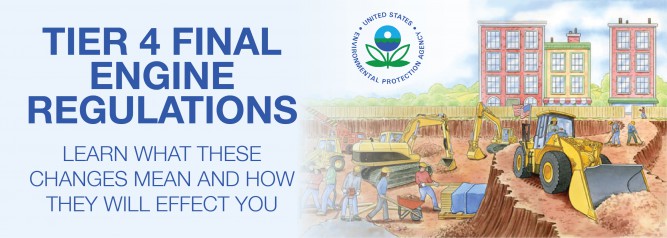
Tier 4 Final Engine Regulations | Learn What These Changes Mean And How They Will Effect You
Unless you’re brand new to the heavy equipment scene, you’ve been following the official progression of steadily tightening emissions standards for commercial diesel engines for years now. We’ve moved through the “tiers” and have finally arrived at Tier 4 Final – expected to be the “final” version of government-mandated changes for the foreseeable future. So what do Tier 4 engine regulations mean for you?

Fleet owners have to meet more stringent requirements than owner-operators. For instance, fleets can only use a remanufactured pre-Tier 4 engine if:
- It meets Tier 4 standards, OR
- You retire another pre-Tier 4 engine and replace it with one that is Tier 4 Final compliant, OR
- You use Best Available Control Technology to retrofit an older engine to meet the latest standards. This option only applies to a few machine-and-engine combinations.
The goal of Tier 4 standards is to dramatically reduce the amount of pollutants and particulates pushed into the atmosphere by diesel engines, compared to a decade or so ago. The latest engines very effectively do that.
Operation is about the same, but maintenance becomes more complex.
Because the new engine changes affect internal, you won’t see much difference in the resulting controls, except perhaps for dashboard alerts that pertaining to new functions. However, because these new engines are more complicated, self-service will cease to be an option for most operators.
Even fleet owners could find that relying on their dealership for service is more cost-effective, because in-house techs will need additional training and re-tooled shops to handle the work. For day-to-day maintenance, it’s essential to use the correct fuels and oils, and if your new engine uses diesel exhaust fluid, that will need periodic refilling.
What makes Tier 4 Final engines compliant?
Each OEM has chosen different technologies for their new engines, but the various improvement options include:
- Improved sensors in engine control modules that can precisely control engine operation to deliver maximum power alongside minimal fuel usage.
- Electronic injection systems with solenoid control that feed fuel more exactly.
- Redesigned components that provide more efficient combustion.
Switching to new materials for manufacturing parts – for example pistons made of a material that is more efficient, stronger and durable than aluminum.
- Exhaust gas recirculation systems that recapture and recycle some of the exhaust, resulting in reduced combustion chamber temperatures as well as lower emissions even under partial load.
- Other after-treatment options that work farther down the line. Two examples are a diesel particulate filter, which trap particulates before they exit the exhaust pipe, and a diesel oxidation catalyst, which fits just ahead of the exhaust pipe and works to oxidize unburned hydrocarbons.
Many of these improvements, while considerably more efficient in meeting Tier 4 engine regulations, are also more costly. That means higher purchase prices and also higher ongoing maintenance costs for after-treatment chemicals, etc. These engines also require Ultra Low Sulfur Diesel. Nonetheless, greater efficiencies also reduce fuel consumption compared to earlier models.
The bottom line for Tier 4 engine regulations is that calculating probable total cost of ownership becomes even more important in evaluating potential new equipment purchases.



 Switching to new materials for manufacturing parts – for example pistons made of a material that is more efficient, stronger and durable than aluminum.
Switching to new materials for manufacturing parts – for example pistons made of a material that is more efficient, stronger and durable than aluminum.